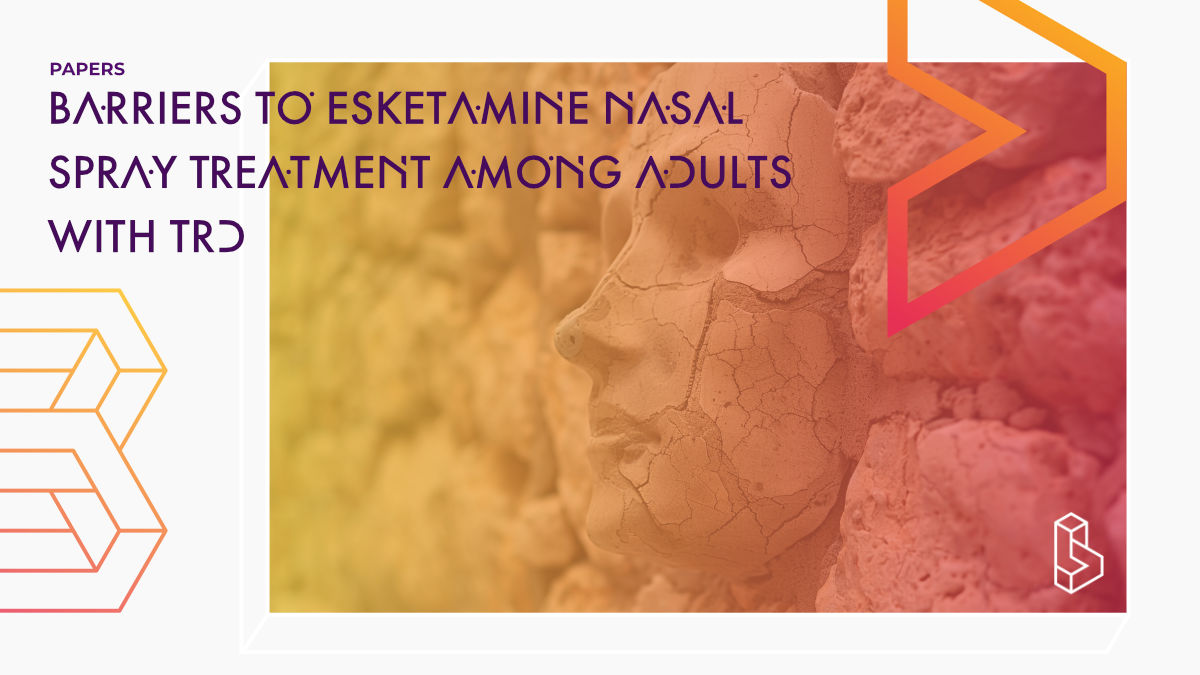This retrospective observational cohort study (n=966 esketamine initiators, n=39,219 controls) examines factors influencing esketamine initiation and continuation for treatment-resistant depression (TRD). Initiators resided closer to treatment centres, with initiation rates decreasing significantly with distance. Factors associated with increased initiation included posttraumatic stress disorder, suicidal ideation, and male sex, while Medicaid, substance use disorder, older age, and greater distance were associated with lower initiation rates. Factors influencing interruption included alcohol use disorder, distance, and minority communities, highlighting potential barriers to treatment access such as travel distance, insurance, socioeconomic status, and ethnicity.
Abstract of Barriers to Esketamine Nasal Spray Treatment Among Adults With Treatment-Resistant Depression
“Background: Under a risk evaluation and mitigation strategy program, esketamine nasal spray CIII requires self administration at a certified treatment center. Our objective was to identify factors associated with esketamine initiation and continuation.
Methods: A retrospective observational cohort study was conducted among US adults who met treatment-resistant depression (TRD) criteria. Cases (n = 966) initiated esketamine between October 11, 2019, and February 28, 2022, and were compared to controls (n = 39,219) with TRD but no esketamine use. Outcomes included initiation, induction (8 administrations within 45 days), and interruptions (30-day treatment gap). Comorbid psychiatric conditions were identified using International Classification of Diseases, Tenth Revision, Clinical Modification, codes.
Results: Cases resided significantly closer to treatment centers (8.9 vs 20.3 miles). Compared to 0–9 miles, initiation rate decreased by 11.9%, 50.8%, 68.1%, 75.9%, and 92.8% for individuals residing 10–19, 20–29, 30–39, 40–49, and 50+ miles from a center. After adjustment, factors associated with increased likelihood of initiation were posttraumatic stress disorder, major depressive disorder with suicidal ideation, and male sex, while increasing distance, substance use disorder, Medicaid, Charlson Comorbidity Index (CCI), and older age were associated with lower likelihood. Factors associated with lower likelihood of completing induction were Medicaid, low socioeconomic status (SES), CCI, and Hispanic communities. Factors associated with increased likelihood of interruption were alcohol use disorder, distance, and minority communities, while generalized anxiety disorder and Medicaid were associated with lower likelihood.
Conclusions: Travel distance, insurance, low SES, and minority communities are potential barriers to treatment. Alternative care models may be needed to ensure adequate access to care.”
Authors: Kruti Joshi, Joshua N. Liberman, Purva Parab, Jonathan D. Darer, & Lisa Harding
Summary of Barriers to Esketamine Nasal Spray Treatment Among Adults With Treatment-Resistant Depression
Some individuals with MDD demonstrate nonresponse to treatment, having persistent symptoms despite multiple trials of therapy. Individuals with TRD have greater mortality and self-harm behaviors than individuals with MDD who respond to treatment.
The US Food and Drug Administration approved esketamine nasal spray CIII (esketamine) for use in combination with a conventional antidepressant for adults with treatment-resistant depression (TRD) or depressive symptoms in adults with major depressive disorder with suicidal ideation or actions.
Transportation and distance to mental health care are barriers to treatment, especially among individuals with lower incomes or inadequate health insurance coverage. Rural areas are also impacted by mental health provider shortages.
Find this paper
Barriers to Esketamine Nasal Spray Treatment Among Adults With Treatment-Resistant Depression
https://doi.org/10.4088/jcp.23m15102
Paywall | Google Scholar | Backup | 🕊
Cite this paper (APA)
Joshi, K., Liberman, J. N., Parab, P., Darer, J. D., & Harding, L. (2024). Barriers to Esketamine Nasal Spray Treatment Among Adults With Treatment-Resistant Depression. The Journal of Clinical Psychiatry, 85(2), 54515.
Study details
Compounds studied
Ketamine
Topics studied
Treatment-Resistant Depression
Depression
PTSD
Opioid Use Disorder
Alcohol Use Disorder
Study characteristics
Observational
Longitudinal
Participants
40185
Humans

